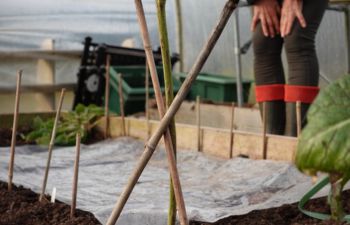Blog
Explore project findings through mixed media reflections on key themes and issues.
Introducing 'Women Back to the Land’
Posted on behalf of: Dr Rachael Durrant
Last updated: Monday, 18 November 2024

Hello and welcome to my research blog for the 'Women Back to the Land' project (or 'Womback' for short). This project explores the movement of women from urban backgrounds into farming and food growing in the UK today.
In this blog, I will be exploring this movement from different perspectives. From the broadest questions like ‘how can we eat well and care for the land that sustains us?’, to the more particular, ‘how has my media diet shaped my outlook on women’s roles in farming?’.
Women’s journeys into and through agroecology in the UK
I recently gave a talk at a fantastic conference run by the Agroecology Research Collaboration and the Association of Applied Biologists. The 'Cultivating Wisdom' conference took place on October 21st – 22nd 2024 at the Birch Community Centre in Manchester.
The title of my talk was, Low pay, poor conditions, and a “fear of that being my future”: Women’s journeys into and through agroecology in the UK. It was based on interviews with women and non-binary farmers, growers and agroecology activists, on their experiences of getting into and working within this sector.
Dr Rachael Durrant speaking at the 'Cultivating Wisdom' Agroecology Conference, October 2024
It started from the premise that, for the agroecology movement in the UK to fulfil its promise as a source of transformative innovation, the sector needs to learn how to foster diversity in its workplaces.
I reported my findings that women's experiences of entering agroecological farming - especially women of colour, queer, and working-class women - are characterised by too many constraints and obstacles around access to work and career progression, and that many are unable to sustain working in the sector as a result. What's more, I found that those mostly white middle-class women who manage to get set up with longer-term access to farmland, often find themselves being marginalised within their workplaces.
If I had more time, I would have also talked about the many new entrant women farmers and growers from diverse backgrounds that are working as activists within agroecological organisations, in addition to their land-based work. By creating safer spaces for vulnerable conversations to unfold within, their activism aims to make space for, foster, and support diversity in the sector.
Perhaps in order to create more inclusive agroecological work environments, more of these conversations need to be had between farm operators and workers to address unmet needs on both sides of the relationship, whilst carefully uplifting the often unheard voices and experiences of new entrants and landless workers.
Learn more about these issues and my project findings in forthcoming posts. To stay updated, follow my Instagram or X, or get in touch to join my mailing list.
